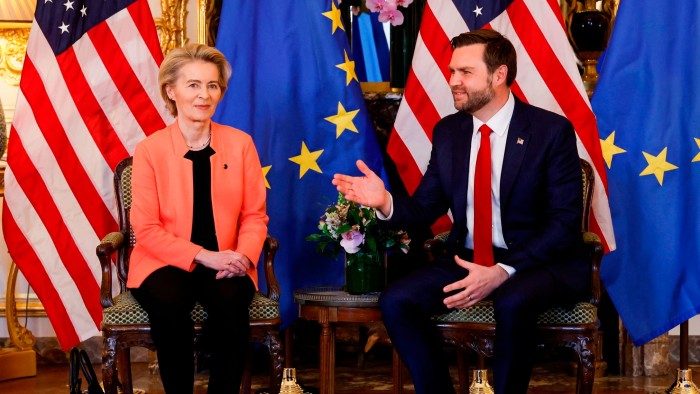European officials fear they will have to bear the cost of postwar security and reconstruction as they reel from being cut out of US-Russia peace negotiations on Ukraine.
Donald Trump said on Wednesday, after talking to Russian President Vladimir Putin, that their delegations would “start negotiations immediately” to end the war, blindsiding European capitals who had failed to make their case for being included in the process.
More than half a dozen senior European officials told the Financial Times they expected the US president to tell them they must pay for Ukrainian reconstruction and deploy troops there to maintain a peace deal in which they would not be involved.
“The Americans don’t see a role for Europe in the big geopolitical questions related to the war. It’s going to be a real test of unity,” said one senior EU official.
“Trump sees us as money. And frankly we haven’t been clear on what our seat at the table would look like in exchange for that money.”
In a statement on Wednesday evening, six European countries, including Germany, France and the UK, said they were ready to “strengthen our support for Ukraine”, adding they were committed to its “independence, sovereignty and territorial integrity in the face of Russia’s war of aggression”.
The joint statement, which also involved the European Commission, added: “We want to discuss the way forward with our American allies . . . Ukraine and Europe must be involved in any negotiations.”
European leaders and ministers are hoping to extract more clarity on Trump’s plans from discussions with US vice-president JD Vance and the president’s Ukraine envoy, Keith Kellogg, at the Munich Security Conference, which begins on Friday.
Nato officials said they did not expect Kellogg to outline the US objectives for the negotiations in Munich, but would sound out European capitals in the weeks to come.
Compounding the sense of disconnect for Europeans, Kellogg was not named by Trump as part of the negotiating team that he ordered to begin peace talks with the Russian side.
As Trump announced the start of negotiations, foreign ministers from France, Germany, Poland, Spain and Italy met the EU’s chief diplomat, Kaja Kallas, in Paris to strategise their approach.
“In this time of uncertainty and changes, it’s more important than ever that . . . Europeans have a common understanding of what’s going on,” Spanish foreign minister José Manuel Albares told the FT.
“It’s more than fair to say that nothing can be agreed about European security without Europe,” he added. “And we don’t think that anything should be decided about Ukraine without Ukraine.”
Prior to Wednesday’s announcement, Trump’s team, including his special envoy Steve Witkoff, had been quietly holding talks with Moscow, and on Tuesday announced the release of an American teacher imprisoned in Russia in exchange for a Russian prisoner.
Trump described Marc Fogel’s release as a potentially “very important element” in ending the war and named Witkoff as part of the negotiating team with the Russian side. The other three negotiators are secretary of state Marco Rubio, CIA director John Ratcliffe and national security adviser Mike Waltz.
In Kyiv, officials have expressed frustration with European leaders over what they perceive as a lack of action. “It’s clear that everyone is waiting for Trump to tell them what to do,” said a senior Ukrainian official.
Ukraine President Volodymyr Zelenskyy, who also received a call from Trump after the Putin conversation, is set to attend the Munich forum. He has repeatedly said that a European-only security guarantee will not be credible without US involvement.
However, European capitals believe Trump does not want his country to play any role in Ukraine’s postwar security, and instead expects Europe to take responsibility for it.
US defence secretary Pete Hegseth said on Wednesday that Europe “must provide the overwhelming share of future lethal and non-lethal aid to Ukraine”.
Hegseth also ruled out US troops being deployed or any role for Nato in co-ordinating boots on the ground after the end of the conflict.
“Any security guarantee should be backed by capable European and non-European troops,” Hegseth said.
A scenario in which “the US says, ‘We did the ceasefire, and all of the rest is for you to clean up’ . . . wouldn’t work [for us]”, said one EU diplomat involved in discussions between European capitals.
“There is a limit to what the EU alone can realistically provide in terms of money, arms, and at some point maybe boots on the ground,” they added.
EU diplomats are increasingly nervous about the difficulties that senior officials, including commission president Ursula von der Leyen, have had in securing meetings with members of the Trump administration.
National governments are often resorting to contacts they have been able to establish bilaterally to glean information on the peace plan before then sharing it with their EU partners.
“The EU institutions are still struggling to find the right person with direct access to Trump to talk to,” said a western official with knowledge of the attempts.
A meeting between Vance and von der Leyen on Tuesday contained few details regarding the outlines for negotiating Ukraine’s future, people briefed on the discussion said, adding that Kellogg was seen as the more important interlocutor regarding Trump’s stance.
Past US administrations valued a dialogue with Brussels in a bid to shore up the transatlantic alliance and maintain unity, said Jeremy Shapiro, research director of the European Council on Foreign Relations.
Trump and his team, however, had shown little interest in doing so, he added. “His role for the Europeans is: Pay for everything. Get no credit. Don’t necessarily even attend the meetings. And shut up.”
Read the full article here




